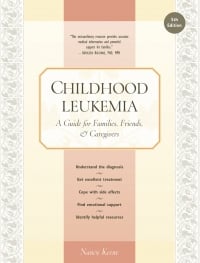Childhood Leukemia
Changing Doctors
Facing childhood cancer is one of life’s greatest struggles. A skilled doctor you trust, who communicates easily and honestly with you, can greatly ease this struggle. If the doctor adds to your family’s discomfort rather than reducing it, you may have to change doctors. Changing doctors is not a step to be taken lightly, but it can be a great relief if the relationship has deteriorated beyond repair. It is a good policy to exhaust all possible remedies before separating and to examine your role in the relationship to prevent the same problems from arising with the new doctor. Mediation by social service staff and improved communication can often resolve the issues and prevent the disruption of changing doctors.
Although there are many valid reasons for changing doctors, some of the most common are:
- Grave medical errors being made.
- Poor communication skills or refusal to answer questions.
- Serious clash of philosophy or personality; for example, a paternalistic doctor and a parent who wishes to be informed and share in decision making.
Many parents, fearing retribution, stay with a doctor in whom they have no confidence. But children may actually suffer more from the added family stress caused by a poor doctor–parent relationship than from changing doctors. Although there may be lingering bitterness or anger between parents and doctors if you change doctors at the children’s hospital, the child will continue to benefit from the best-known treatment.
Early in my daughter’s treatment, we changed doctors. The first was aloof and patronizing, and the second was smart, warm, funny, and caring. He was a constant bright spot in our lives through some dark times. So every year during my daughter’s treatment, she and her younger sister put on their Santa hats and brought homemade cookies to her doctor and nurse. This year was the first time she was able to walk in, and she looked them in the eye and sang, “We Wish You a Merry Christmas.” Her nurse went in the back room and cried, and her doctor got misty-eyed. I’ll always be thankful for their care.
Once the decision is made to change doctors, parents must be candid. They should give an explanation for the change, either verbally or in writing, and make a formal request to transfer records to the new doctor. Doctors are legally required to transfer all records upon written request.

We’ve had wonderful docs, mediocre docs, and one who made a terrible mistake. We’ve had warm, compassionate docs, ho-hum docs (on a good day they’re nice, on a bad day they’re neutral), and we’ve met a couple of world-class jerks. Sounds pretty much like a slice of humanity, right?
Parents hold doctors to a different standard because the stakes are so high—our kids’ lives. But the reality is they are usually overworked, exhausted, and deal with newly diagnosed families on an almost daily basis, day after day, week after week, year after year. I can’t even begin to imagine the emotional toll that must take.
I tell my kids all human relationships are like a goodwill bank. If you make lots of deposits, an occasional withdrawal won’t be so noticeable. I tell my docs and my kids’ docs whenever things go right. I like to write, so I send many thank-you notes. When our pediatrician went on sabbatical, he took me into his office and showed me every Christmas card my kids had created and sent him lined up on the back of his messy desk.
I also have been known to bring in brownies for the office staff. We did this on my daughter’s last day of radiation and several people brushed away tears when they saw the thank-you note she drew—a picture of herself holding a Snow White and the Seven Dwarves audiotape. She listened to that during every radiation session because I’d promised that day’s radiation treatment would be over before the dwarves appeared.
I recently asked one of my favorite doctors (a pediatric oncologist who has incredible compassion) how many thank-you notes she had received from parents over the years. She said she could count them on two hands. I asked how many complaints, and she said, “You wouldn’t want to know.”
So, while I think docs should be called out for bad behavior and bad medicine, I also think we should continually acknowledge good medicine and good behavior. I’d like to encourage the good ones to stick around—new little innocents keep getting cancer every day.
Table of Contents
All Guides- Introduction
- 1. Diagnosis
- 2. Overview of Childhood Leukemia
- 3. Acute Lymphoblastic Leukemia
- 4. Acute Myeloid Leukemia
- 5. Juvenile Myelomonocytic Leukemia
- 6. Chronic Myelogenous Leukemia
- 7. Telling Your Child and Others
- 8. Choosing a Treatment
- 9. Coping with Procedures
- 10. Forming a Partnership with the Medical Team
- 11. Hospitalization
- 12. Central Venous Catheters
- 13. Chemotherapy and Other Medications
- 14. Common Side Effects of Treatment
- 15. Radiation Therapy
- 16. Stem Cell Transplantation
- 17. Siblings
- 18. Family and Friends
- 19. Communication and Behavior
- 20. School
- 21. Sources of Support
- 22. Nutrition
- 23. Insurance, Record-keeping, and Financial Assistance
- 24. End of Treatment and Beyond
- 25. Relapse
- 26. Death and Bereavement
- Appendix A. Blood Tests and What They Mean
- Appendix B. Resource Organizations
- Appendix C. Books, Websites, and Support Groups

